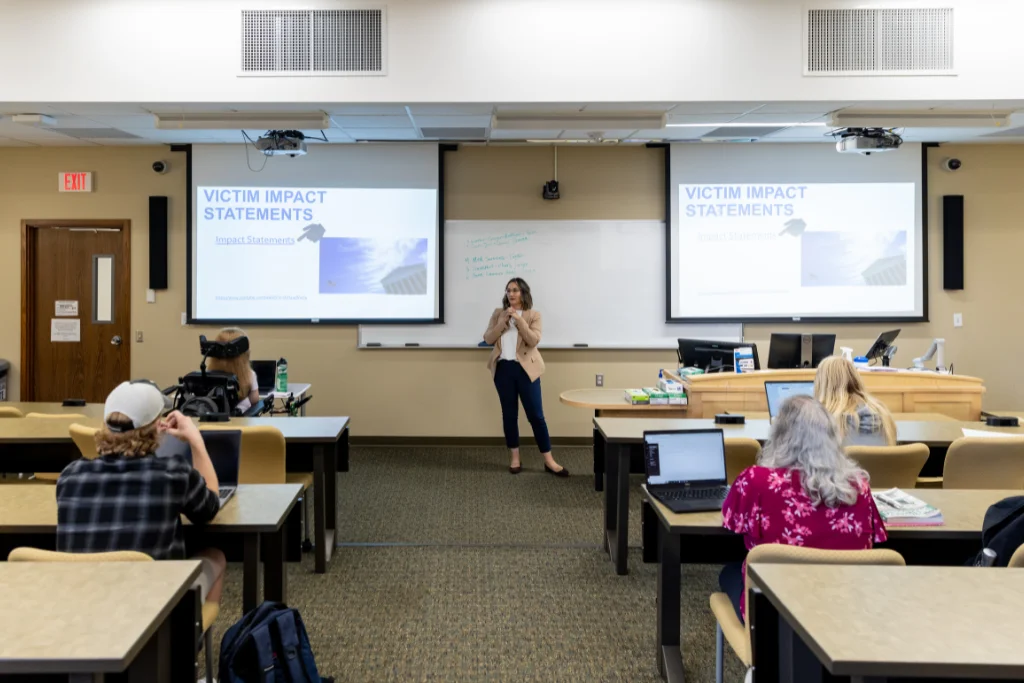
How to Become an FBI Agent: Qualifications and Salary
Are you intrigued by the action-packed life of a special agent and wondering what’s the path to becoming an FBI agent?
Request Information
When most people think of FBI agents, images from Hollywood blockbusters and dramatic TV series often come to mind—shadowy figures in suits swiftly navigating through danger and intrigue. While these portrayals can be exaggerated and not entirely accurate, they often capture the critical essence of the role: the importance of the work FBI agents do.
The Federal Bureau of Investigation (FBI) is a principal federal law enforcement agency of the United States government, dedicated to investigating dangerous criminals and threats to national security. FBI agents, also known as Special Agents, are tasked with upholding the Constitution and laws of the United States through various complex and sensitive investigations.
What Does an FBI Agent Do?
FBI agents are integral to maintaining national security and investigating various federal crimes. Their responsibilities include conducting detailed investigations, gathering and analyzing evidence, and working closely with other law enforcement agencies to uphold federal laws. FBI agents might also often find themselves testifying in federal court, performing surveillance operations, or executing search warrants as part of their daily duties.
The scope of an FBI agent's work is vast and varied, encompassing several areas of specialization. Some of these include:
- Counterterrorism: Preventing and responding to terrorist threats and activities both domestically and internationally.
- Cybercrime: Tackling crimes related to digital and information technology infrastructures, such as hacking and online fraud.
- Organized Crime: Investigating groups involved in ongoing criminal enterprises, including drug trafficking and human smuggling.
- Public Corruption: Uncovering corruption within public offices, ensuring government officials comply with the law.
- Civil Rights: Enforcing the civil rights code, investigating hate crimes, and other violations that infringe on individual freedoms.
What Qualifications Do You Need to Become an FBI Agent?
Becoming an FBI agent is a significant achievement that requires a solid educational foundation, specific skills, and a strong personal character. Firstly, all candidates must be U.S. citizens and able to obtain a top-secret security clearance.
They should be between the ages of 23 and 36, able to meet the FBI's strict drug policy, and have substantial professional work experience. Additionally, a bachelor's degree is a fundamental requirement, but depending on the field of work within the FBI, other advanced degrees can be highly advantageous—like a degree in computer science or cybersecurity if you want to be part of the cybercrime unit. These degrees prepare candidates to handle complex cyber investigations, including hacking, cyber fraud, and other technology-related crimes.
However, the most straightforward educational path for aspiring FBI agents is a degree in criminal justice. This degree provides a comprehensive understanding of the criminal justice system, laws, and procedures directly applicable to an FBI agent's daily tasks.

Candidates can also benefit from different educational backgrounds, depending on their specialization. For example, agents specializing in profiling or negotiating during hostage situations would benefit from a background in psychology. A degree in sociology would be helpful for agents working in units that study the behavior of groups and structures within society.
Crime scene investigators, on the other hand, must have a degree in forensic science. Agents working in fields like counterterrorism or dealing with crimes related to political corruption can benefit from a background in political science. This education helps them to understand the political landscape and motivations behind terrorism and political crimes. Moreover, degrees in finance or accounting can be valuable, especially for agents who deal with white-collar crimes.
In addition to these educational qualifications, all potential FBI agents must complete a rigorous physical fitness test, undergo a detailed background check, and complete training at the FBI Academy in Quantico, Virginia. This thorough preparation ensures that FBI agents are not only well-equipped in their specialized fields but are also physically and mentally prepared to tackle the challenges of the job. By aligning their education with the specific needs of their desired roles within the FBI, candidates can significantly enhance their effectiveness and career prospects in this prestigious agency.
Steps Required To Become an FBI Special Agent (SASS Process)
Becoming an FBI Special Agent is a rigorous and selective process that typically takes about one year to complete, though it can sometimes extend longer. Each step of the Special Agent Selection System (SASS) is designed to assess a candidate's mental and physical capabilities, ethical standards, and dedication to upholding the Constitution and laws of the United States.
This multi-step process ensures that only the most qualified candidates join the ranks of the FBI, prepared to handle the complex and demanding nature of federal law enforcement.
Step 1: Application and Screening
The first step in the SASS process involves a thorough application and screening phase. Candidates must submit a detailed application, including official transcripts, employment history, and relevant military records (if they have so). This initial screening ensures that all applicants meet the minimum qualifications required for the role, such as U.S. citizenship, a valid driver's license, and a clean legal record.
Step 2: Phase I Test
Following successful initial screening, applicants take the Phase I Test, a computerized exam conducted in a proctored environment. This test includes sections on logic-based reasoning, figural reasoning, personality assessment, preferences and interests, and situational judgment, designed to evaluate the candidate's cognitive and psychological readiness for the demands of the job.
Step 3: Meet and Greet Information Session
Candidates who pass the Phase I Test are invited to a meet-and-greet session. The candidate's processing field office typically hosts this session, which includes an in-person review of the application to validate submitted information. It also serves as an initial personal interaction with FBI personnel, who assess the candidate's professionalism and potential fit within the agency.
Step 4: Official Physical Fitness Test (PFT)
The PFT assesses candidates' physical readiness to perform the demanding duties of an FBI agent. It includes events such as sit-ups, a 300-meter sprint, push-ups, and a 1.5-mile run. Candidates must score a minimum number of points across these events to pass.
Step 5: Phase II Test
As candidates move along the admission pipeline, they are tested again. Phase II of the testing process involves a structured interview and a writing assessment conducted by a panel of three FBI special agents. This phase assesses the candidate's ability to think critically and communicate effectively, as these are essential skills to achieve success in the field.

Step 6: Conditional Appointment Offer (CAO)
After the candidate passes the Phase II Test they move to a Conditional Appointment Offer. This offer is contingent upon the candidate passing subsequent steps in the selection process, including rigorous background checks and medical evaluations.
Step 7: Background Investigation (BI)
Before everything is finalized, the future FBI agents go through a comprehensive background investigation. This is done to ensure the candidate's suitability for a top-secret security clearance. The investigation includes interviews with acquaintances and checking candidates' financial, criminal, and employment histories.
Step 8: Fitness-for-Duty Medical Exam
Before candidates become special agents, they undergo a detailed medical exam to ensure they are medically fit for duty. This includes vision and hearing tests, as well as overall health assessments to manage the job's physical demands.
Step 9: Pre-Quantic Physical Fitness Test (PFT)
Prior to attending the FBI Academy, candidates must pass another Physical Fitness Test. This ensures they have maintained or improved their physical fitness levels since their initial PFT.
Step 10: Basic Field Training Course (BFTC)
Now, as the process of becoming an FBI special agent approaches its final stages, candidates undergo an intense 20-week program at the FBI Academy in Quantico, VA. The BFTC includes coursework in federal law, investigative techniques, firearms training, and operational skills. Graduation from the BFTC is required to move forward.
Step 11: Career Placement
Upon successfully completing the BFTC, agents are assigned to one of the FBI's 56 field offices nationwide. Assignments are based on the agency's needs and the new agent's background and areas of expertise. This marks the final step in becoming an FBI Special Agent, ready to contribute to the FBI's mission on the ground.
Salary and Benefits of an FBI Special Agent
FBI Special Agents enjoy a competitive salary range from $81,000 to $129,000 for new agents, with the potential for higher earnings for supervisory positions. The role offers a diverse array of impactful career experiences, ensuring that no two days are the same. Agents are encouraged to stay fit and healthy with dedicated time for exercise each week and are required to work an average of 50 hours.
There are also opportunities for international assignments and generous relocation benefits that cover expenses for the first assignment and most subsequent transfers, fostering a dynamic and adaptable career path.
Conclusion
If you meet the main eligibility criteria and are considering a career as an FBI agent, starting with a bachelor’s degree from the University of North Dakota (UND) can set you on the right path. UND offers a variety of relevant undergraduate programs, graduate degrees and a J.D. law program for those looking to further enhance their qualifications.
So, explore the opportunities at UND and take the first step towards a role where every day is a new mission to protect and serve—a true calling for the fearless.
FAQs
You need at least a bachelor's degree in any field, but degrees in criminal justice, cybersecurity, or related fields are particularly beneficial, depending on the specialization.
It typically takes at least six years to become an FBI agent—four to earn a bachelor's degree and a minimum of two years of professional work experience—followed by the FBI's rigorous selection process, which can last 6 to 12 months.
Yes, candidates must be at least 23 years old and younger than 37 at the time of appointment, with limited exceptions for those with prior federal law enforcement experience.
Automatic disqualifiers include non-U.S. citizenship, conviction of a felony, certain misdemeanors, default on a federally guaranteed student loan, and failure to register for the Selective Service System (for males).